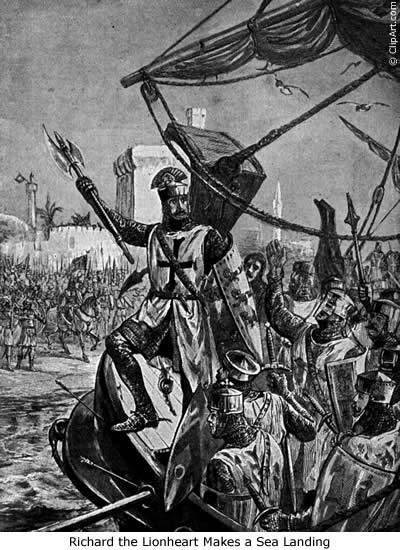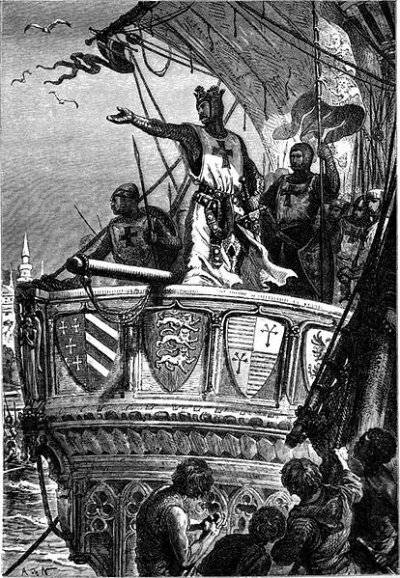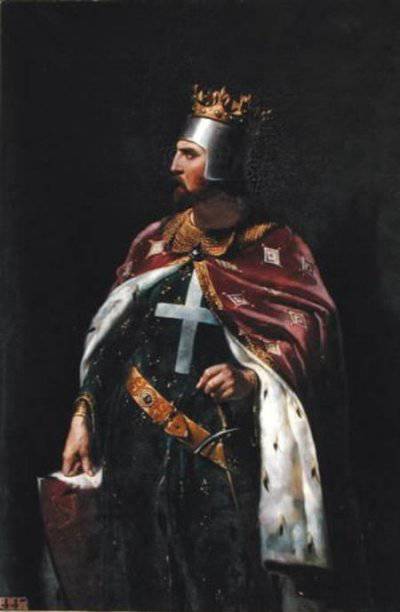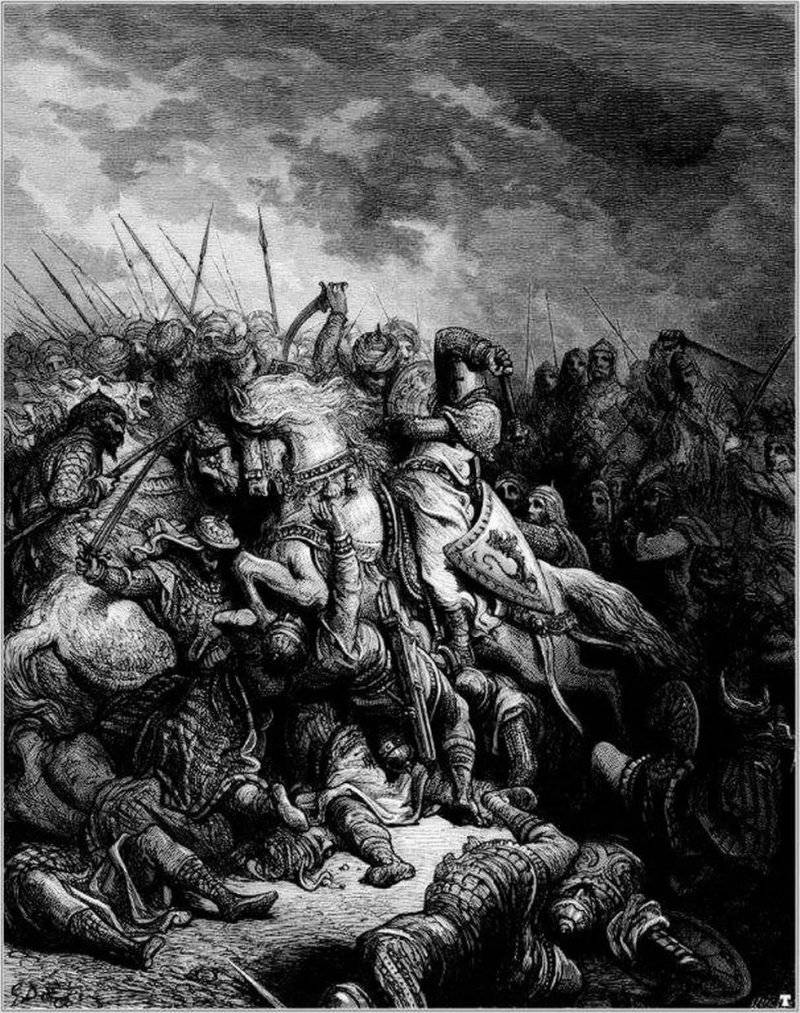Richard the Lionheart
 Richard the Lionheart, son of Henry II Plantagenet and Eleanor of Aquitaine, was born on September 8 of the year 1157. Initially, Richard was not considered as the direct heir to the throne, which to a certain extent influenced the formation of his character. In 1172, Richard was proclaimed Duke of Aquitaine, which made the future king fully enjoy all the delights of feudal civil strife. Very soon, the confrontation with his own father and brother was also added to the classic melkofeodalnye rifts. In 1183, Richard was faced with a difficult choice: take the oath to his elder brother and completely lose political independence or choose the path of an independent ruler. Richard chose the latter. In response to the audacity of the elder brother of Richard Heinrich invaded his possession, but soon fell ill and died. Despite what happened between the children, Richard's father Henry II ordered him to give Aquitaine to his younger brother John. Richard resisted the will of his father and went to exacerbate the conflict, during which a real war broke out between him and his younger brothers Jeffrey and John. Realizing the ugly essence of what is happening, threatening to grow into an absurd fratricide, King Henry II decided to stop the fraternal dispute over the lands of the duchy, transferring it to the possession of his mother Richard. Despite the relative reconciliation, good kinship in the family of Richard and failed to recover. This was due to rumors that Henry II, in violation of customs, intends to transfer power to his youngest son, John.
Richard the Lionheart, son of Henry II Plantagenet and Eleanor of Aquitaine, was born on September 8 of the year 1157. Initially, Richard was not considered as the direct heir to the throne, which to a certain extent influenced the formation of his character. In 1172, Richard was proclaimed Duke of Aquitaine, which made the future king fully enjoy all the delights of feudal civil strife. Very soon, the confrontation with his own father and brother was also added to the classic melkofeodalnye rifts. In 1183, Richard was faced with a difficult choice: take the oath to his elder brother and completely lose political independence or choose the path of an independent ruler. Richard chose the latter. In response to the audacity of the elder brother of Richard Heinrich invaded his possession, but soon fell ill and died. Despite what happened between the children, Richard's father Henry II ordered him to give Aquitaine to his younger brother John. Richard resisted the will of his father and went to exacerbate the conflict, during which a real war broke out between him and his younger brothers Jeffrey and John. Realizing the ugly essence of what is happening, threatening to grow into an absurd fratricide, King Henry II decided to stop the fraternal dispute over the lands of the duchy, transferring it to the possession of his mother Richard. Despite the relative reconciliation, good kinship in the family of Richard and failed to recover. This was due to rumors that Henry II, in violation of customs, intends to transfer power to his youngest son, John.The discord in the English royal family hastened to take advantage of the French king. In 1187, he showed Richard the text of the secret message of his father, in which Henry II asked Philip's permission to marry his (Philip) sister Alice (formerly engaged to Richard) to John, and then transfer the Duchy of Aquiet and Aquitaine to his possession.
So in the royal family was brewing a new conflict, eventually forcing Richard to speak out against his father. In 1189, in alliance with the French king, Richard began an open confrontation with his father, as a result of Henry II lost all continental possessions, except Normandy. Already in the summer of 1189, Henry II surrendered all his positions, after which he died.
3 September 1189, Richard was crowned in Westminster Abbey. After gaining power, Richard began preparations for the Third Crusade, organized with the blessing of Pope Clement III. In addition to Richard, the German emperor Frederick I Barbarossa and the French king Philip II August took part in this campaign.
Richard I convinced the French king of the advantages of the sea route to the Holy Land, which saved the Crusaders from many troubles. The campaign began in the spring of 1190, at that time the Crusaders went through France and Burgundy to the shores of the Mediterranean. At the beginning of July, Richard of England and French King Philip August met in Wesel. The monarchs and their warriors, having greeted each other, continued their further journey together for a while. However, from Lyon, the French crusaders moved towards Genoa, and Richard went to Marseille.
Having embarked on the ships, the British began a campaign to the east, and on September 23 had already made the first stop in Messina, Sicily. However, they had to linger due to the hostility of the local population. Sicilians not only showered the Crusaders with ridicule and brutal abuse, but also did not miss the opportunity to attack and cruel reprisals against unarmed Crusaders. October 3 insignificant collision in the market was the reason for this war. Hastily armed, the townspeople prepared for battle, settling down on the towers and walls of the city. Despite the fact that Richard was trying to prevent the ruin of a Christian city, the British decided to storm. And after the sortie undertaken by the townspeople the next day, the king led his army, and the British, driving the enemy back into the city, seized the gate and sternly dealt with the vanquished.
This delay forced to postpone the campaign until next year, besides having a bad effect on the relations between the two monarchs. Periodically between them there were small clashes, in the end they left Sicily, finally quarreling. Philip moved directly to Syria, and Richard had to make another stop in Cyprus.
 The fact is that during the storm a part of the English ships raging waves nailed to the Cretan coast. The ruler of Cyprus, Emperor Isaac Comnenus, appropriated them, relying on coastal law, which formally was on his side. Of course, this was not to the liking of the Crusaders, who landed on Cyprus 6 May 1191. The battle began, but the Greeks quickly retreated, unable to bear the blow. The battle was resumed the next day, Richard fought bravely in the first row, he even managed to seize the banner of Isaac, knocking the emperor himself with a lance. As in the previous battle, the Greeks were defeated.
The fact is that during the storm a part of the English ships raging waves nailed to the Cretan coast. The ruler of Cyprus, Emperor Isaac Comnenus, appropriated them, relying on coastal law, which formally was on his side. Of course, this was not to the liking of the Crusaders, who landed on Cyprus 6 May 1191. The battle began, but the Greeks quickly retreated, unable to bear the blow. The battle was resumed the next day, Richard fought bravely in the first row, he even managed to seize the banner of Isaac, knocking the emperor himself with a lance. As in the previous battle, the Greeks were defeated.Less than a week later, on May 12, the wedding of King Richard and Berengaria of Navarre took place in the captured city. Meanwhile, Isaac, aware of his own miscalculations, began negotiations with Richard. The terms of the peace treaty obliged Isaac not only to pay the indemnity, but also to the discovery of all the fortresses before the crusaders, and the Greeks also had to set up auxiliary troops for a crusade.
However, Richard did not intend to deprive Isaac of imperial power until Isaac escaped to Famagusta, accusing Richard of assaulting his life. Enraged by the treachery of Comnenus, the king ordered the fleet guard the shores so that Isaac does not run away again. After that, Richard sent an army to Famagusta, capturing which he went to Nicosia. On the way to Tremifussia, another battle took place, after the victory in which Richard I solemnly entered the capital, where he was detained for a while by an illness.
At this time in the mountains of Cyprus, the Crusaders under the command of the King of Jerusalem Guido seized the strongest castles, and among the captives was the only daughter of Isaac. Under the yoke of all these failures on May 31, the emperor surrendered to the mercy of the victors. Thus, in less than a month of war, Richard captured the island of Crete, whose strategic importance can hardly be overestimated in our day.
Richard's further journey lay in Syria. In early July, Richard arrived at the location of the siege camp under the walls of the city of Acre. With the arrival of the Knights of Richard, the siege of the city intensified. Gaps were punched within the walls of the city, and on July X. the besieged agreed to negotiate the surrender of the city. The very next day the knights entered the city, which had been laying siege for two years.
The victory gave rise to controversy in the ranks of the Crusaders. The question arose of who should be king of Jerusalem. Each of the allies offered his own candidacy and did not want to yield. Overshadowed the universal triumph and the scandalous episode with the Austrian banner. Most historians describe it this way. After the capture of Acre by order of the Austrian duke Leopold, an Austrian standard was raised above his house. Seeing this, Richard was angry and ordered to tear the banner and throw it in the dirt. The fact is that Leopold is located in a house in the English occupation sector. The result of the scandal erupted was the departure of a significant part of the Crusaders on their way back. With their departure, Richard became the sole commander of the Crusader troops.
Now that Richard I for English got his sonorous and romantic nickname. At first glance, the nickname "Lionheart" indicates the royal courage of its bearer and was given for some courageous feat. However, this is absolutely not the case. Richard had the reputation of an extremely cruel and angry to unbridled and even absurd leader. With the capitulation of Acre to Saladin, the following conditions were put forward: to release all captured crusaders and pay indemnities to 200 thousands of gold marks. Saladin did not refuse to meet these requirements, but did not mature by a predetermined date. Upon learning of this, Richard went berserk and ordered the execution of Muslim hostages in front of the gates of Acre near 2000. For this truly bestial cruelty, which, among other things, doomed to the similar fate of many of the captured Christians, Richard I English received his famous nickname "The Lion Heart". In addition, one of the main Christian shrines, the Life-Giving Cross, remained in the hands of Muslims.
Soon, Richard decides to launch an offensive against Jerusalem. Having collected 50-ti thousandth army of the Crusaders, he went on the march. It was in the Jerusalem campaign that the military genius of Richard was fully revealed, combining the talent of a military strategist and the greatest organizer who managed to unite under his banner a mixed tribe of knights accustomed to feudal strife.
The hike was organized very strictly. Richard categorically forbade his fighters to engage in minor skirmishes and thereby go on about the enemy, who was trying to disrupt the march of the Crusaders. To repel the threat posed by Muslim horse archers, Richard ordered the organization of reliable escort from crossbowmen.
The most notable battle episode during the march of Richard’s army on Jerusalem took place on September 7 1191 near the village of Arzuf. Saladin ambushed and attacked the rear of Richard’s column. Initially, Richard ordered the rearguard not to respond and continue the march. After some time, followed by an organized Crusader counterattack, which determined the outcome of the battle within a few minutes. The losses of the crusaders were 700 people, while the Mamelukes Saladin lost ten times more killed - 7000 fighters. After that, Saladin no longer engaged in an open battle with the knights of Richard.
However, the small skirmishes of the Crusaders with the Mamelukes continued. Simultaneously with the sluggish fighting, Saladin and Richard conducted negotiations, which, however, ended in nothing, and in the winter of 1192, Richard resumed his march on Jerusalem. However, this time the campaign was not completed, the crusaders returned to Askelon, restoring the destroyed city and making a powerful fortress from it.
 In May, 1192, Richard took Darumu - a powerful fortification south of Askelon, after which he set out again for Jerusalem. But this time the campaign ended at Beitnuba. The reason for this was the doubts of the leaders of the Crusaders about the feasibility of a future assault on Jerusalem. There were proposals to turn to Egypt or Damascus. Be that as it may, the Crusaders gradually began to leave Palestine.
In May, 1192, Richard took Darumu - a powerful fortification south of Askelon, after which he set out again for Jerusalem. But this time the campaign ended at Beitnuba. The reason for this was the doubts of the leaders of the Crusaders about the feasibility of a future assault on Jerusalem. There were proposals to turn to Egypt or Damascus. Be that as it may, the Crusaders gradually began to leave Palestine.According to the agreement signed by the opponents in September, Jerusalem and the Life-Creating Cross remained for Muslims, the fate of the captured crusaders was also in the hands of Saladin, and the crusaders fortress Askelon was dismantled. All the military successes of Richard in the region were practically reduced to zero.
After the conclusion of the contract, Richard sailed to England. And then he remembered the old grievances. Hunting for Richard began his sworn enemy - the Austrian Duke Leopold. In addition, due to the fact that Richard maintained close relations with the Welfe and Normans, long-time enemies of Hohenstaufen, the German Emperor Henry VI also became the opponent of Richard.
Richard’s ship ran aground off the Italian coast, and he was forced to go ashore. This was soon discovered by Duke Leopold, and on December 21 1192, Richard was arrested.
The German Emperor Henry VI learned about the seizure of Richard, and the Duke Leopold handed the prisoner to him. Richard was forced to take a sworn oath to Henry VI, and only after that was he released. In March 1194, he finally reached England. London met the king with festivities. However, not having stayed in England even before the summer, Richard, who initially preferred to engage in war, rather than state administration, departed for Normandy.
During the years of Richard's wanderings, King Philip II of France succeeded in squeezing the English on the continent significantly. Richard could not wait to confuse the French. During the Norman expedition, Richard managed to win several major victories and take a number of fortresses. Philip had to sign a peace, under the terms of which the French were deprived of eastern Normandy. However, they still had several strategically important fortresses on the Seine. 26 March 1199 during the siege of the castle Shalyu-Shabrol Richard was seriously wounded by an arbalest arrow. And although the arrow did not hurt any important organ, the wound and the subsequent operation resulted in a blood infection, which caused his death. King Richard I The English Lionheart died 813 years ago - April 6 1199.

Information